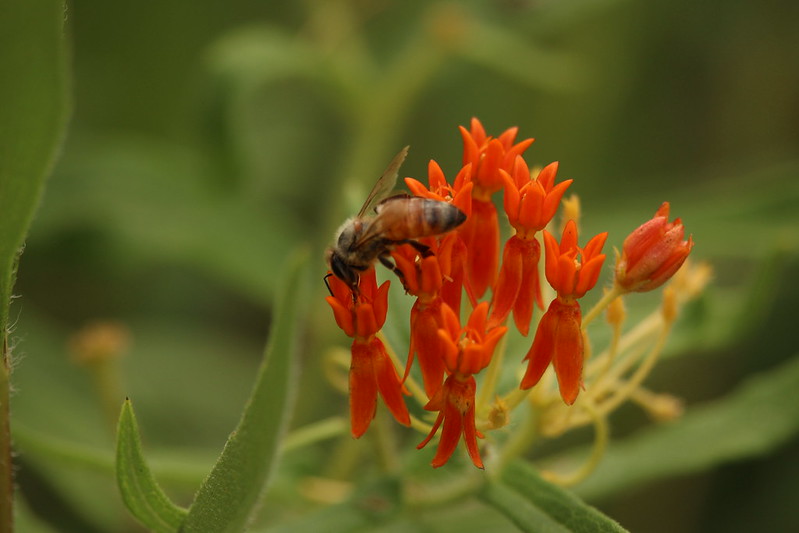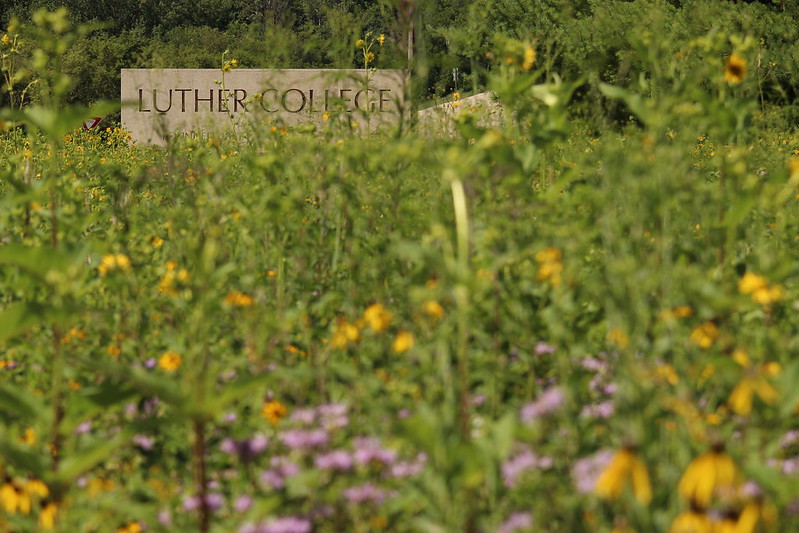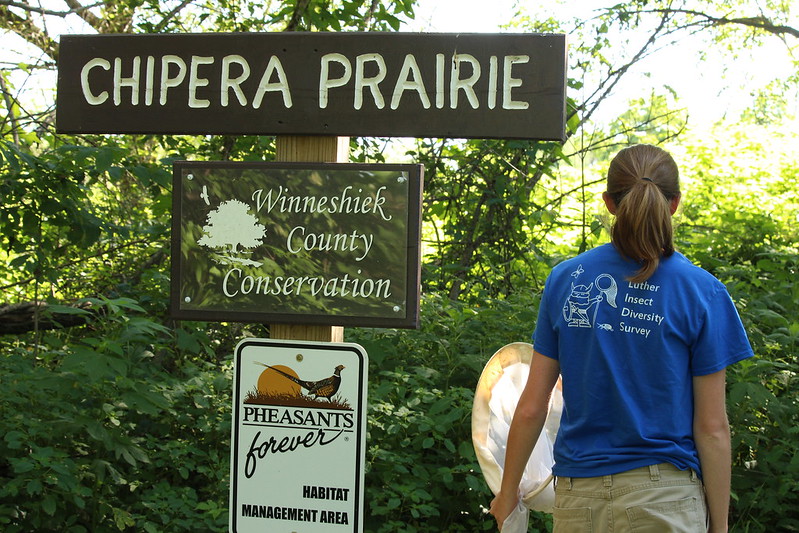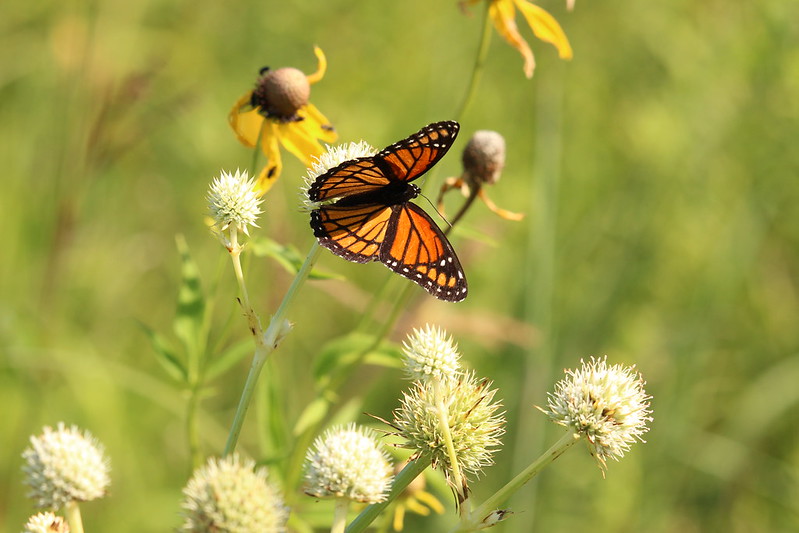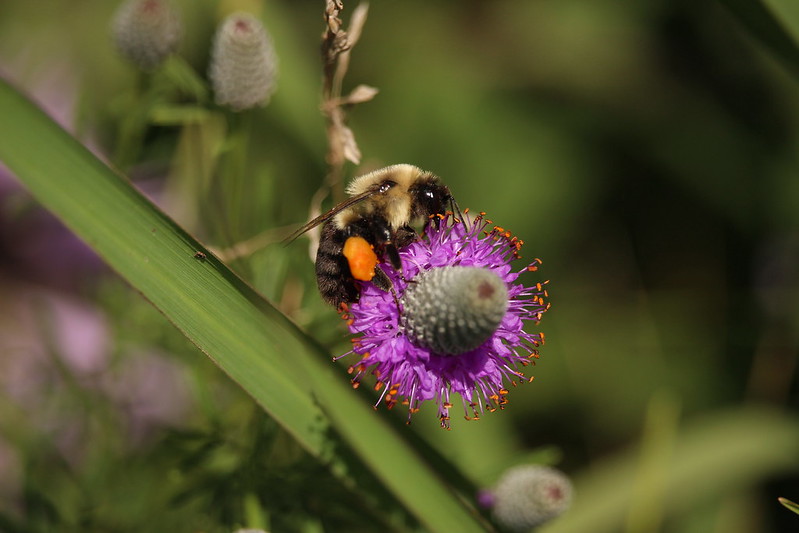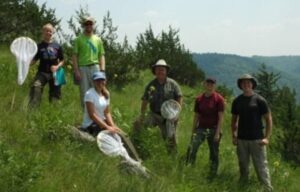
2013 Summer Entomology Research Group
Entomology at Luther
Students at Luther College interested in insect biology have the opportunity to pursue a well-rounded biology major that provides an extremely strong foundation for future graduate study in entomology. Students take introductory Entomology (Bio 251) with an emphasis on insect diversity, taxonomy, and ecology, and scientific writing. Students can be involved in entomological research (either at Luther or elsewhere) obtaining important and necessary undergraduate research experiences. They can also work as a laboratory assistant in the majors Biology 251: Entomology or non-majors Biology 112: Insects, Humans & the Environment courses.
Student Participation at Professional Entomology Meetings
Luther students regularly present results of their entomological undergraduate research at regional and national scientific meetings of the ESA, usually with most expenses associated with attending these meetings covered by Honors research grants.
View our Entomology images on our Flickr site.
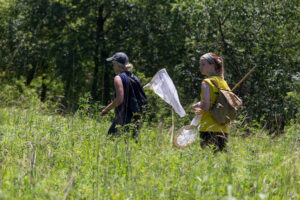
Summer research students surveying pollinators in Luther’s natural areas.
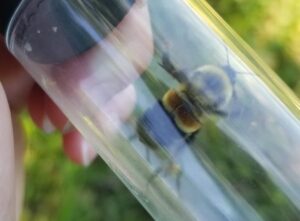
Rusty Patched Bumble Bee
- Research on Pollinator Diversity and Conservation. Numerous research projects on pollinators such as native bees, moths, and butterflies have been performed over the past 25 years by the Luther biology department.
- Landscaping with Native Plants. Many of the landscape plantings on the central campus have been converted from non-native plants to native plants over the past 20 years thanks to the efforts of our grounds crew.
- Prairie Plantings. Approximately 120 acres of native diverse tallgrass prairie habitat has been planted on campus over the past 30 years in Anderson Prairie, Gateway Prairie, Aikman Prairie, Jewell Prairie, and West River Prairie.
- Oak-Woodland Restorations. Oak woodland and oak savanna restoration efforts include brush clearing and prescribed burning to restore understory vegetation in Hickory Ridge Woods and Flying Squirrel Forest. These ongoing activities have created and enhanced areas of pollinator habitat on college lands.
- Invasive Species Control. The natural areas land stewardship crew under the leadership of our natural areas land manager removes and treats invasive species such as garlic mustard and European buckthorn from our forests. Periodic “buckthorn blitzes” that have provided hundreds of Luther students opportunities to remove invasive species on campus, which enhances pollinator habitat.
- Prescribed Burning of Native Habitats. Our prescribed burn program trains students in fire safety and fire ecology, then involves them in prescribed burns of our prairies and woodlands.
- Reducing Herbicide Use. On campus spraying of herbicides by the grounds crew in facilities has been dramatically reduced and follows strict application guidelines which minimizes exposure and areas of application.
- Home to Rusty Patched Bumble Bee. In our natural areas beyond the central campus, the Federally-endangered rusty patched bumble bee, Bombus affinis, has been found, and the mix of prairie and woodlands on the landscape make our campus an ideal home for this endangered and protected species of bumble bee.
- Honey Bees. The Luther entomology research lab maintains several honey bee hives on campus, and proceeds from the sale of honey support pollinator conservation and research efforts on campus.
- Native Plant Sale. The natural areas land stewardship program has an annual native plant sale at the local farmers market each spring, and one emphasis of this sale is to help local residents understand the importance of native plants in pollinator conservation.
- Education on Pollinators. Numerous courses on campus have pollinators as a focus or topic as part of the curriculum. Student projects often focus on pollinator diversity and ecology.
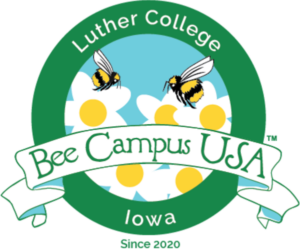
Bee Campus USA Logo
Bee City USA and Bee Campus USA are initiatives of the Xerces Society for Invertebrate Conservation, a nonprofit organization based in Portland, Oregon, with offices across the country. Bee City USA’s mission is to galvanize communities and campuses to sustain pollinators by providing them with healthy habitat, rich in a variety of native plants and free of pesticides. Pollinators like bumble bees, sweat bees, mason bees, honey bees, butterflies, moths, beetles, flies, hummingbirds and many others are responsible for the reproduction of almost 90 percent of the world’s flowering plant species and one in every three bites of food we consume.
For more information about Bee Campus USA, visit https://www.beecityusa.org/. For more information about the Xerces Society, visit https://xerces.org/. For information about four simple ways to help pollinators, visit https://xerces.org/bringbackthepollinators/.
For more information about Luther’s Bee Campus USA activities, contact the Luther Entomology Research lab: buglab@luther.edu.
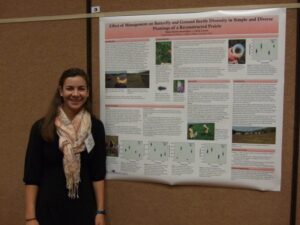
Nikki McDermond-Spies with award-winning poster in Plant-Insect Ecosystem poster competition at 2012 NCB-ESA meeting in Lincoln, Nebraska.
Presentation Competitions: Katie Hopp (’06), Derek Broman (’07), and Clare Brandt (’16) have each won second place in the ESA President’s Prize student poster competition as undergraduates, prior to 2010 competing against Ph.D. and master’s graduate students with their presentations at national meeting of the ESA. Nikki McDermond-Spies (’13) was runner-up in the Plant-Insect Ecosystem section poster competition at the North Central Branch-ESA meeting in Lincoln, Nebraska in June 2012. Most recently, Lena Schmitt (’20) and Maggie Anderson (’20) took 1st and 2nd place in the undergraduate poster competition at the national ESA meeting in St. Louis, MO.
Luther College Biology Lab with Kirk Larsen
